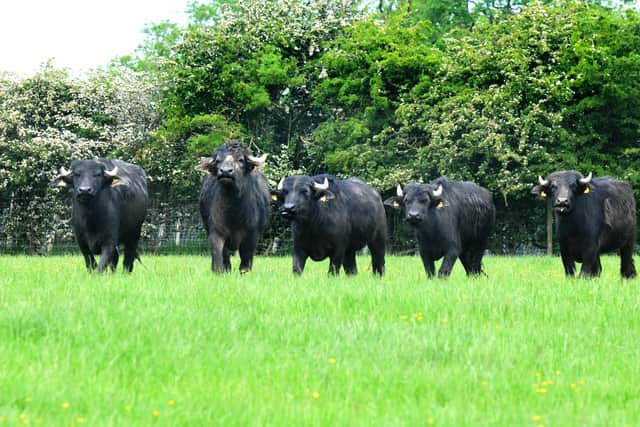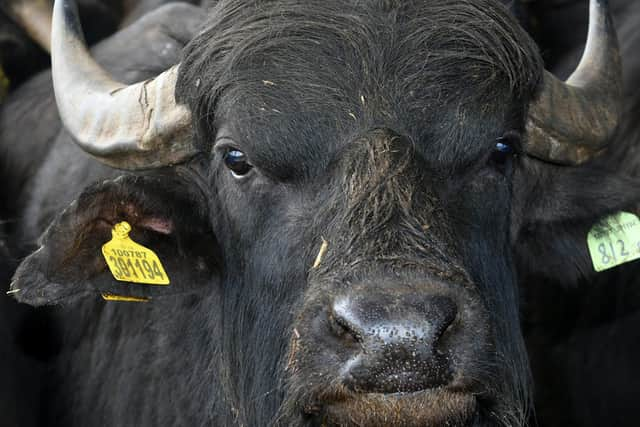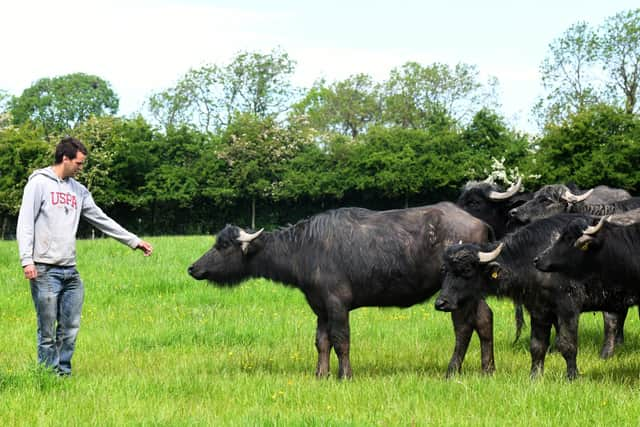Meet the buffalo farmers from Yorkshire who have found a niche market venture
That was some 25 years ago – now they have up to 300 buffalo and are one of just six herds of the animal in the country.
As an adult, Andrew, has joined the family business, with dad Paul and mum Kate and was a finalist last year in the Northern Farmer Awards’ Young Farmer category.
Advertisement
Hide AdAdvertisement
Hide AdThe Langthornes have carved out a niche market for their products which they sell from their farm shop at Crawford Grange in Northallerton.


They found that the customers for buffalo, which is not a mainstream meat and dairy product in the UK, are from ethnic minorities and there is a high demand for buffalo products, plus other items, such as exotic fruit and veg and rices and spices which the Langthornes source from London wholesale markets to sell back in North Yorkshire.
Andrew, 26, said: “I was allergic to cows milk when I was born, dad tried goats milk but that did not work and saw a couple of buffalos advertised in Farmers Weekly and thought he would give it a go. We started with two and ended up where we are now.
“Butchers weren’t interested in selling so we had to find our own market. We started selling them locally and it took off. You have to find your own market as there is no established market, you have to make it yourself.
Advertisement
Hide AdAdvertisement
Hide Ad"When we started we had nowhere near as much as we have now. People come expecting a farm shop, walk in and realise it is foreign food but a lot of people like that. They can get stuff for all these recipes that they have seen on the television. Anything they can’t get in the supermarket they can generally find in our shop.”


The Langthornes stopped with dairy farming from 2001 to concentrate on farming buffalo and also had to build their own abattoir as local and commercial ones couldn’t process the animal.
They process around five buffalo a week and bring in animals from other herds as the gestation period is almost a year.
That said, they are not the easiest animals to deal with.
Mr Langthorne said: “Some people with 10 or 20, can’t manage them so we buy from there, and Holland. They are another level to dairy because they are the most temperamental animal you have ever seen.


Advertisement
Hide AdAdvertisement
Hide Ad"Buffalos from Holland - you just don’t go in with them. There is only me that will go anywhere near them. If you are strict they will understand, they won’t touch you. One slight bit of you being scared and they are all over you. They will have you out of the pen and pin you up on the gate.
“They are certainly different to a normal cow, destroying fences is life to them. We have had 2,000 metres of brand new fencing in 2019 and 40 per cent will already be in need of repair. Barbed wire doesn’t stop them, that is just a scratching post.
“If you upset a buffalo, it will sit down and you haven’t a chance of moving it until it wants to. If I am TB testing and one sits down, I go and have a cup of tea and then come back, they are stubborn animals and sulk.”
They feed on grass or maize and nuts and are generally healthy. The average age in the Langthorne herd is four or five years-old but they have lived to 20 and still breeding at that. The yield of cheese is twice as solid compared to cows milk because of the levels of fat and protein.
Mr Langthorne also keeps a number of other rarebreed animals such as Native Aberdeen Angus and Saddleback Pigs.
Comment Guidelines
National World encourages reader discussion on our stories. User feedback, insights and back-and-forth exchanges add a rich layer of context to reporting. Please review our Community Guidelines before commenting.
